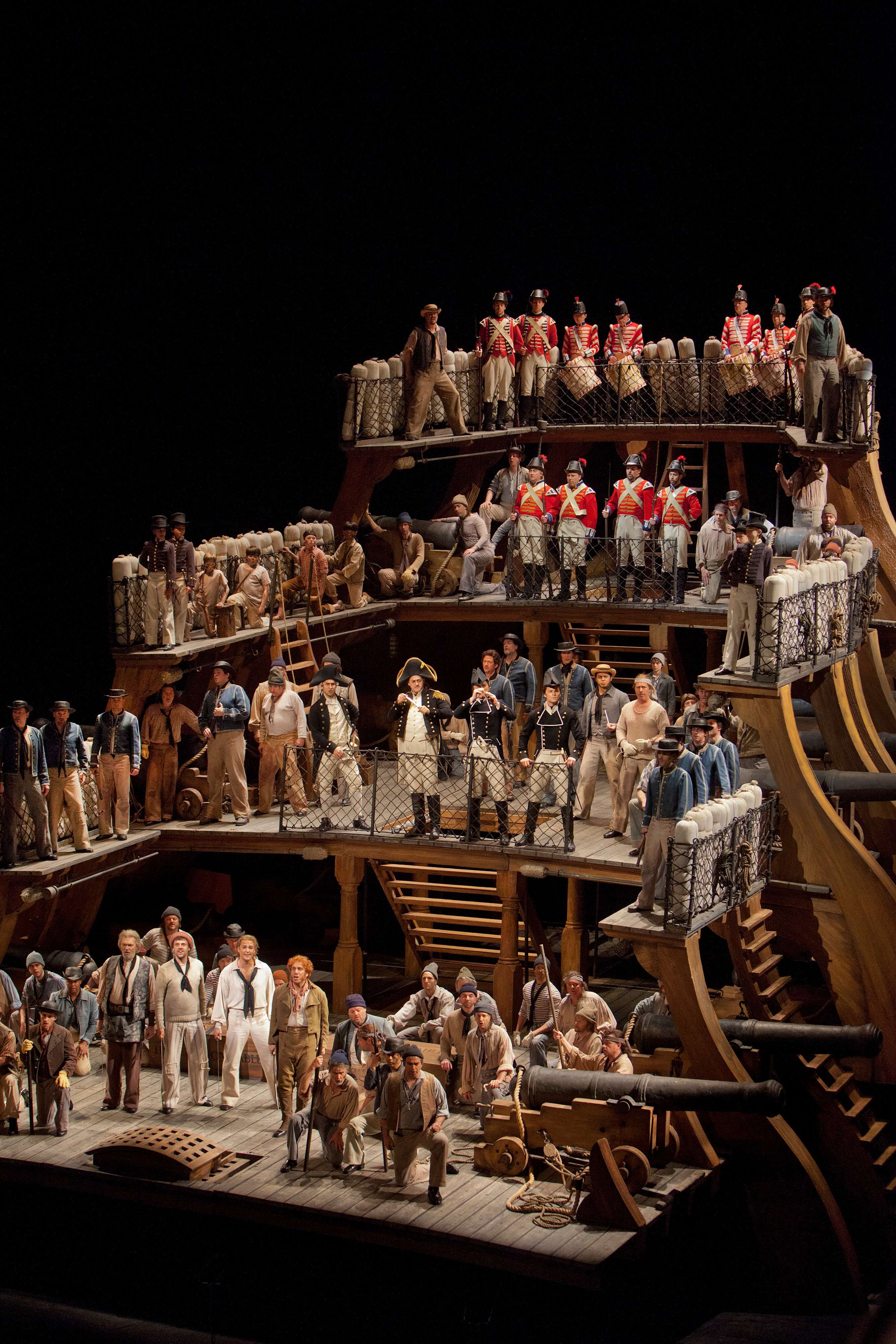|
Back
The Bitter End New York
The Metropolitan Opera
05/04/2012 - & May 10*, 12, 2012
Benjamin Britten: Billy Budd
John Daszak (Captain Vere), Nathan Gunn (Billy Budd), James Morris (Claggart), Dwayne Croft (Mr. Redburn), Ryan McKinny (Mr. Ratcliffe), Kyle Ketelsen (Mr. Flint), John Cheek (Dansker)
Metropolitan Opera Orchestra and Chorus, Donald Palumbo (Chorus Master), David Robertson (Conductor)
John Dexter (Production), William Dudley (Set Design), Gil Wechsler (Lighting Design)

(© Ken Howard/Met Opera)
A too brief revival of John Dexter’s 1978 production of Billy Budd marked the end of the current Metropolitan Opera season. What a note to cast us out upon!
Dexter’s unit set presents the deck of a warship of Nelson’s navy, steeply raked like a ship on the high sea. The set cleverly rises and lowers to reveal various spaces below decks. The compartmentalized structure also serves to emphasize both the self-contained microcosm of such a ship and its rigid and immutable class structure.
Singing the title role, Nathan Gunn was an energetic and enthusiastic Billy. He readily conveyed the necessary air of innocence, grace, and strength, as well as a profound joy in his work and the companionship of the crew. Wanting only to be given greater responsibility as a reward for his loyalty, he seemed genuinely unable to comprehend more complex and nefarious motivations in others. Although occasionally overwhelmed by the orchestra during more boisterous scenes, his lyric baritone reached an aching sweetness in his last aria as he reconciled himself to his fate.
In his Met debut, John Daszak was a very human Captain Vere. As the old captain, he bleached the color from his voice and created an almost hollow sound that captured his moral anguish and regret. As a younger man striding about his ship, however, he was all authority and power, in voice and presence, until his moral compass began to fail and gnawing doubt crept in.
James Morris is strongly associated with the role of John Claggart at the Met, singing it at the premier of this production, the Met’s first, and in all but one of the six revivals since. His voice was strong and commanding, not plush, but with depth and dark colors that captured the character’s profound nihilism. His mere presence on stage created a sense of mesmerizing evil. The subtle gesture with which he very slowly pulled Billy’s kerchief from around his neck was charged with suppressed homoeroticism. His performance was a masterpiece of restraint, with nothing overplayed, and all the more effective for it.
The three officers provided some brilliant ensembles, their voices blending wonderfully, yet always distinct. Kyle Ketelsen, as Mr. Flint, stood out especially. He seemed to ground them, with his rich and resonant bass-baritone providing some of the most purely beautiful singing of the evening. Dwayne Croft, a former Billy Budd at the Met, sang Mr. Redburn with verve and authority. Perhaps their most striking scene was the rehashing of two recent mutinies, as their fear nearly breaks the surface. Mutiny for grievances they can understand, but the case of the Nore, sedition motivated by political ideas, terrifies them. It seems inexplicable, beyond control, a force of nature. Their interweaving plaints of “but the Nore” establish a sense of the fragility of this floating microcosm, a thin shell of wood on the infinite sea, a thin veneer of law over a society of virtual slaves. In the end, of course, it comes down to the fragility of goodness in the face of evil and fear, and the fragility of a single human life. But in this scene we first see the razors edge between order and chaos, and the atmosphere of underlying fear that makes the rest possible. The scene is haunting. Mr. Ketelsen and Mr. Croft made it beautifully chilling.
Serving under these officers were the men of the Metropolitan Opera chorus, a doughty crew of the rough men who formed the first family Billy had known. They conveyed the sense of resignation and toil pervading the ship. But they also provided the few moments of relief from the mounting dramatic tension. The first of these moments was as the men improvised their own entertainment, singing and dancing on the forecastle, and establishing Billy’s rapid rise to popularity. The other was the preparation for battle after sighting of the French sail, which temporarily dispels the tension of the plot closing on Billy. The chorus and orchestra create an excitement of anticipation tinged with fear that builds thrillingly until it ends in the blinding flash of a cannon fired on stage, and a shift in the wind that puts battle out of reach.
The chorus’ most moving contribution, however, was their response to Billy’s execution. The heart-rending chorus of inarticulate moans created a sense of potential violence, quickly melting into almost unbearable pain. Although occasionally overpowering the singers, conductor David Robertson brought out beautiful textures in the atmospheric score. From the first tendrils of mist weaving through the overture, to the insistent roll of the sea or the beat of martial drums, they wove a spell that made us all shipmates.
We suffered Billy’s unjust end as that of a brother, and went forth into the night, reminded of how splendid the Met can be, just as the season ends.
Arlene Judith Klotzko
|